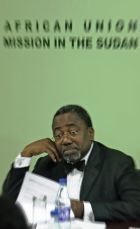Head of Darfur peacekeepers to request help from key UN Security Council states
April 25, 2009 (EL FASHER) – Facing ongoing insecurity and military engagements in Darfur, the joint UN-African Union Mission in Darfur (UNAMID) will send its highest official to New York to plead for donations of key equipment, said Noureddine Mezni, the UNAMID spokesperson.

“During his visit to New York, Adada will meet with a number of UN officials as well as some members of the Security Council to review with them a series of issues pertaining to the deployment of the hybrid operation and ways and means to provide UNAMID with the required key enablers, in order to enhance the capacity of the Mission and enable it to carry out its mandate more effectively,” stated Mezni.
Although Mezni did not directly mention the helicopters, his use of the phrase “key enablers” exactly mirrors the language used by UN Secretary General Ban Ki-Moon in a reference to the helicopters in a report April 14.
Ban had said, “Despite the arrival of additional troops and units, the mission’s actual operational impact remains constrained by the continued absence of key enablers such as the medium transport units, an aerial reconnaissance unit, a Level-II hospital (which would be placed in El Fasher) and 18 medium-utility helicopters. Preparatory work for the arrival of five tactical helicopters from Ethiopia is ongoing.”
Moreover, the Mission’s commanding officer, General Martin Luther Awai, has made repeated public appeals for the helicopters. Particularly recently, Agwai made a direct appeal to the top US official in Khartoum on March 16 in a meeting at the US Embassy.
Although the US Senate had unanimously resolved in February 2008, in a measure introduced by then-Senator Joseph Biden, that the US should provide the helicopters if no one else would, the resolution has not been implemented.
However, at the beginning of April the Ethiopian government agreed to provide UNAMID with 5 tactical helicopters. Mezni today made reference to the 185th meeting of the Peace and Security Council of the African Union held on April 6, 2009, where Ethiopia was commended for its decision to provide the aircrafts.
Adada had traveled to the meeting in order to brief the Council on this same issue. The AU Council issued a press statement praising the Mission’s personnel and leadership “for their dedication and contribution to the promotion of lasting peace and reconciliation in Darfur.”
UN officials consider the helicopters to be important: “The provision of outstanding equipment, in particular military helicopter assets, remains critical to increasing the mobility and operational impact of the mission. I reiterate my appeal to Member States who are in a position to provide these mission-critical capabilities to do so without further delay,” the UN Secretary-General wrote in his April report.
UNAMID’s 13,208 military forces – a figure current as of April 24 – are tasked with protecting 2.7 million displaced civilians in Darfur. The Mission also has 2,478 police and 3,388 civilian staff.
The deployed civilian staff comprised 942 international staff, 2,142 national staff and 299 UN volunteers, 942 international staff, 2,142 national staff, and 299 UN volunteers, said the UNAMID spokesperson.
The hybrid operation formally began operating December 31, 2007, taking over from an earlier AU force.
Though it is deployed in areas throughout Darfur, the mission “continued to face restrictions on its freedom of movement… imposed mainly by the Government of the Sudan forces before and after military engagements with different movements,” the UN Secretary-General claimed in his report covering the months February and March 2009.
(ST)
